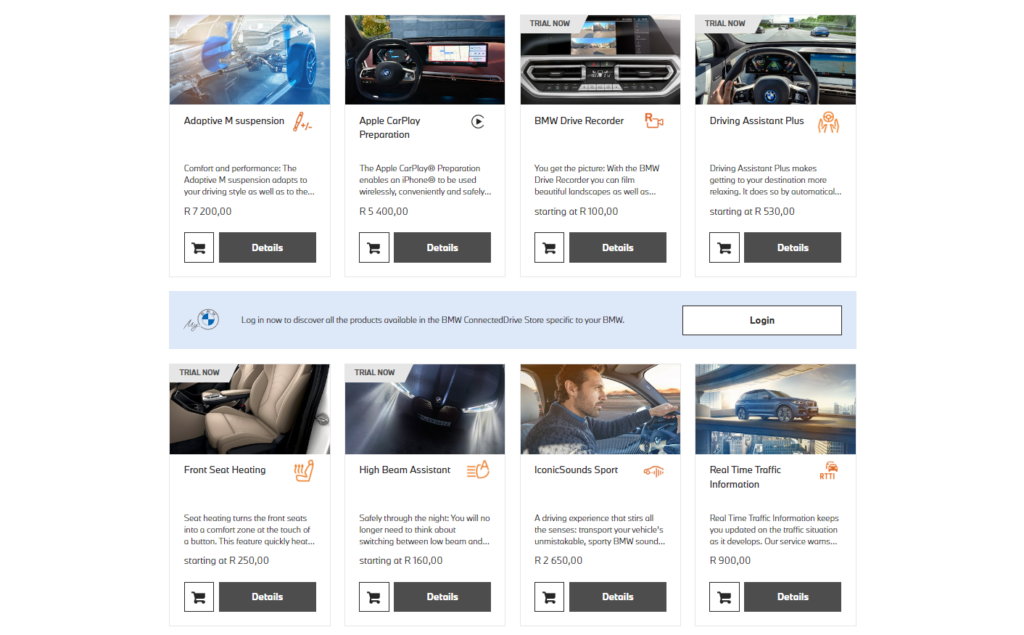Car makers charging extra for additional features in cars is nothing new. But BMW is one of the first manufacturers with a local presence to take that to the next level. As part of its optional extras, the German company now charges a monthly fee for selected features. Front seat and steering wheel heating, various driving assistant options, and automatic high beams are some of what is currently available as monthly subscriptions.
On BMW’s Connected Drive page, you’ll find traditional optional extras, like adaptive M suspension for R7,200. This time, though, you’re buying the ability to turn it on. You first have to check if your car is compatible. In other words, your car already has the feature physically installed. You won’t be able to magic the ability into your 1990 BMW E30 M3 (unless you get some new bits installed).
Driving goes pay-to-drive
Then there are other features like front-seat heating and high beam assistant. Again, your vehicle needs to already have seat warmers and compatible headlights installed so that you can pay for the privilege to use the tech BMW stuck in your car. Or you can pay for the feature outright. That’s an option too.
That seat warming feature costs R250/m, if you’re considering a month-to-month basis. If you prefer to buy in bulk, a year’s sub will cost R2,400. Or you can opt for a three-year subscription for R3,800. If subscriptions aren’t for you, there’s an ‘unlimited’ option for R6,600. That one has a small caveat, “Unlimited as long as the technical prerequisites are met for this vehicle.” We’re not sure how you physically uninstall seat-warmers, which sounds like the only way you’d lose access. Unless by “technical prerequisites” BMW means that software updates might mean the feature is no longer supported. But they wouldn’t do that. Would they?
This move toward microtransactions has been talked about before, and not just by BMW. Tesla and Toyota have previously made attempts at using the subscription model for features that were standard in previous vehicles. These were not exactly warmly received.

Usually, with optional extras, the added cost is somewhat justifiable under the assumption that the car does not have ‘the thing’. So ‘the thing’ must be added to the car. An extra thing costs extra money.
Now, the extra ‘thing’ is already in the car. It doesn’t cost BMW more money to produce a car with heated seats disabled than one with it enabled because they’re installed and functional in both. That makes this move seem like a cash grab.
Enough subscriptions
In BMW’s defense, some of these subscription features make sense. Real-time traffic info means additional monthly costs for the company, to cover servers or for gathering the necessary information. It makes sense to charge, like getting Netflix Premium over the standard package. But Netflix isn’t bringing the DVDs to your house and then not letting you watch them unless you pay extra.
The reality is that in-car subscriptions are probably going to work. The kinds of folks to whom BMW markets its vehicles might think twice, briefly, about paying a little more for heated seats. But they won’t suffer a cold bum when they can afford not to. As a result, more car manufacturers looking to cash-in could put features behind a subscription paywall. Then everyone loses Except car makers, of course.
Source: The Verge




